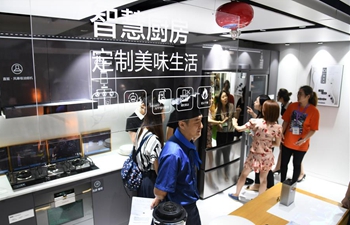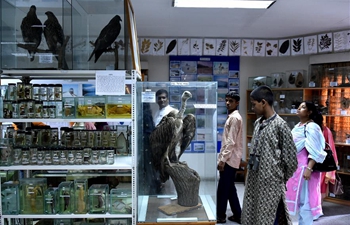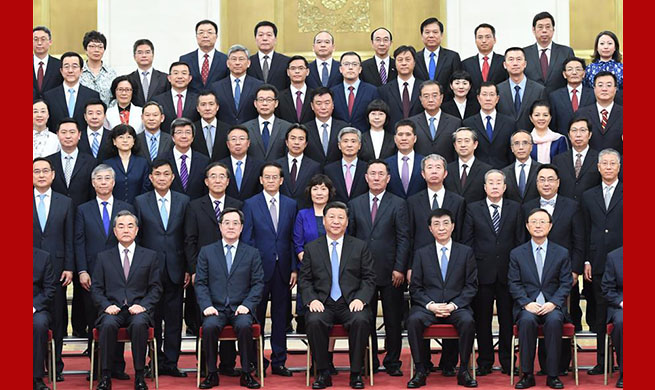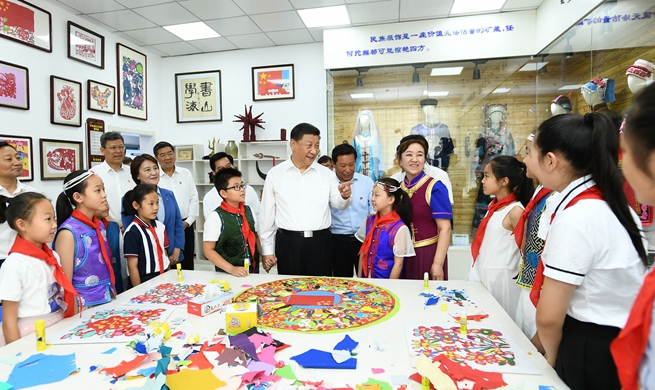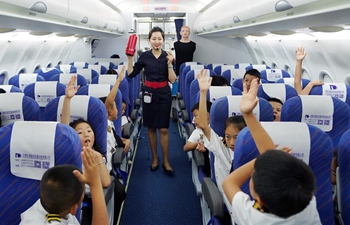by Mao Pengfei, Nguon Sovan
PHNOM PENH, July 19 (Xinhua) -- Growing economic and trade relations between China and the Association of Southeast Asian Nations (ASEAN) are crucial to securing long-term peace and shared prosperity in the region, said Cambodian officials, scholars and exporters.
ASEAN became China's second-largest trading partner in the first half of 2019, overtaking the United States for the first time since 1997. China's customs data showed that China's trade with ASEAN rose 10.5 percent to nearly 2 trillion yuan (291 billion U.S. dollars) in the first half of this year, as China's trade with the U.S. dropped 9 percent to 1.8 trillion yuan (262 billion U.S. dollars).
Ministry of Commerce Under Secretary of State and Spokesman Seang Thay said China has been one of ASEAN's most important trade and investment partners and vice versa thanks to geographic proximity and strategic partnership between the two sides.
"ASEAN and China have so far cooperated very well in economic and trade sectors," he told Xinhua. "With joint efforts and high commitment made by the leaders of China and ASEAN, I believe that the two-way trade volume between the two sides will continue to increase in coming years."
Multilateral and bilateral free trade agreements have significantly boosted China-ASEAN trade and investment relations, he said.
ASEAN, established in 1967, groups Cambodia, Brunei, Indonesia, Laos, Malaysia, Mynamar, the Philippines, Singapore, Thailand and Vietnam.
The spokesman added that the negotiations on the Regional Comprehensive Economic Partnership (RCEP) free trade agreement, which is expected to be concluded by the end of this year, will become a new booster for the development of China-ASEAN economic and trade exchanges.
Chheang Vannarith, president of the Asian Vision Institute, said China is the top trading partner of ASEAN and ASEAN is the second largest trading partner of China.
"The increasing economic interdependence between the two economies is the cornerstone of long-term peace and shared prosperity in the region," he told Xinhua.
"Against the backdrop of rising protectionism and unilateralism, China and ASEAN are compelled to deepening their economic integration and advancing inclusive, open, effective and rules-based multilateral system," he said.
Joseph Matthews, a senior professor at the BELTEI International University in Phnom Penh, said the steady growth of economic and trade ties between China and ASEAN was underpinned by strategic mutual trust and confidence between the two sides.
"China's principle of adhering to mutual respect and treating each other as equals is the fundamental principle to continuously deepen the cooperative relationship between China and ASEAN," he told Xinhua.
He said China is playing a very important role as the global economic stabilizer, and driving force to alleviate, reduce and ultimately eliminate the poverty in the region.
"The China-ASEAN or China-Cambodia relationship and partnerships are on the rise, and in the future this relationship will grow stronger and closer," he said.
Mey Kalyan, a senior advisor to the Supreme National Economic Council, said economic and trade development between China and ASEAN has benefited both sides and the whole region.
"This will help build stronger and more stable and open Asia," he told Xinhua.
Hun Lak, director of Mekong Oryza and Longmate Agriculture companies, which export rice and banana to China, said both China and ASEAN reaped the benefits of growing trade volume between the two sides.
"It benefits more and more enterprises and peoples in the two sides," he told Xinhua. "ASEAN enterprises and people have benefited a lot from the ASEAN-China economic and trade cooperation because there has been a huge influx of investment capital, technologies, technical skills, goods, services, raw materials from China to ASEAN."
DETERMINATION TO SAFEGUARD MULTILATERALISM, BOOST ASEAN-CHINA TRADE TIES
As trade protectionism rises on global market, Seang Thay praised China for holding international expos such as the first China International Import Expo (CIIE) in Shanghai last November, saying that the move reflected China's determination to further open its market to the world and promote multilateral trading system.
"Cambodia always supports multilateral trading system and global trade liberalization," he said, adding that the country took part in the first CIIE and would join it again this year.
"This is a golden opportunity for us to showcase our products to China and all participating countries from around the world," he said.
Matthews said multilateral and free trade practices are key to developing the underdeveloped and neglected poor countries, and eliminating poverty, especially in Sub-Sahara Africa, South Asia and Latin American countries.
"Protectionism, unilateralism, unfair economic sanctions on other countries, trade tariff barriers, and using trade as a weapon to intimidate or to subjugate sovereign states in the name of democracy and human rights are all malpractices," he said.
Matthews said China-proposed Belt and Road Initiative (BRI) is also a key factor contributing to the rapid growth of China-ASEAN trade volume.
CAMBODIA-CHINA TRADE VOLUME EXPECTED TO GROW BIGGER
Seang Thay said Cambodia-China trade volume steadily grew from 5.8 billion U.S. dollars in 2017, to over 6 billion dollars in 2018, and is expected to hit 10 billion dollars in 2023.
"We're optimistic about the rising economic and trade ties between our two countries, and we thank China for purchasing our agricultural products," he said.
"China is the biggest buyer of our rice, and recently China has also begun to import yellow bananas from Cambodia," he said. "These have greatly benefited our farmers, creating jobs and increasing their incomes."
According to the spokesman, to date, several Cambodian agricultural products, including rice, cassava, maize and banana, have been exported to China.
"We're very positive about the Chinese market and we hope that other Cambodian agricultural products such as mango, cashew nut and longan will also be allowed to be shipped to the Chinese market in coming years," he said.
Hun Lak said his Mekong Oryza and Longmate Agriculture companies are expected to export about 10,000 tons of milled rice and 20,000 tons of bananas, respectively to the Chinese market this year.
"For Cambodia, China is a huge market for our agricultural products," he said. "The more China buys our products, the more jobs and incomes there are for our farmers."
Matthews said China, in the last two years alone, has become the largest Cambodian rice importer.
"This trend is also motivating local farmers to plant more rice and other cash crops for exports to China," he said.
He said Chinese investors and tourists have greatly contributed to Cambodia's socio-economic development by creating hundreds of thousands of jobs for Cambodians.
Kalyan said it's good for Cambodia to have China as a big market for its agricultural produces when the European Union is making the export of Cambodian agricultural products more difficult.
"We need China's support and sharing of agricultural technologies with our farmers so that benefits will be widely shared among people," he said.




